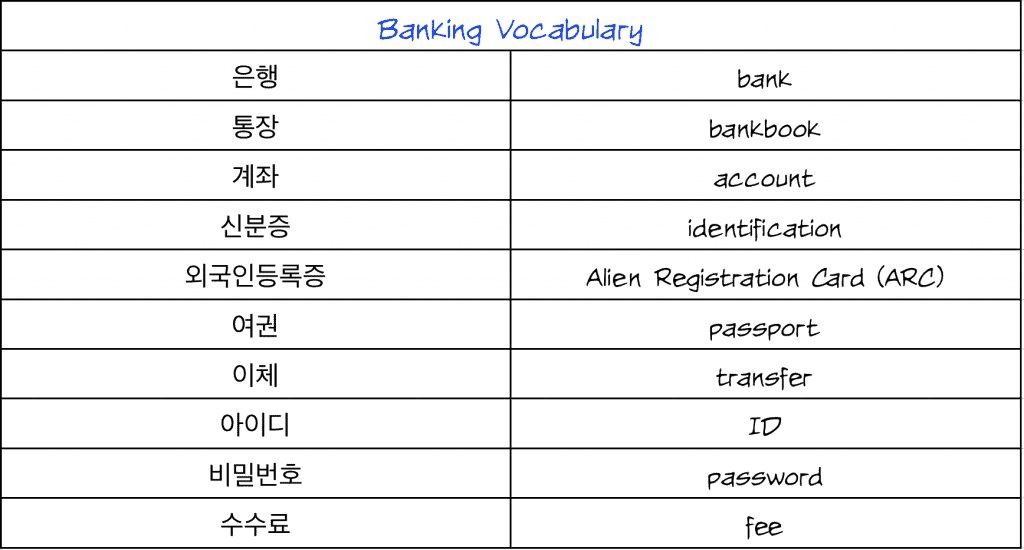It’s finally happened. You’ve stuffed so much money under your mattress that you are having trouble sleeping at night. Is it time to open up a bank account in Korea?
Good question! Before you get started, let’s talk about what you need to know about having a bank account in Korea. After we cover the ins and outs of banking in Korea, we’ll give you a few banks to investigate. If you want to study Korean banking vocab, scroll to the bottom for common banking words. You can use them to impress the bank tellers when you stop off at your neighborhood branch!
So who needs this info? Do you? Maybe! This info may be useful if:
- You’re thinking about moving to Korea
- Will be moving to Korea soon
- Study Korean at a school and are only here temporarily
- Get paid from an employer overseas
- Want to brush up on your Korean banking knowledge
One thing to note here is that Korea is a rapidly changing country. With that said, the banking rules and requirements are constantly being updated. Use this info as a general guide, but make sure you call your bank first before you head in to open a bank account in Korea.
Here we go!
Requirements
This is going to vary from bank to bank. Having an ARC (Alien Registration Card) will be the best and give you the most options for account functionality. For example, an ARC card may allow you to do online banking, get an ATM card, and transfer money overseas. If you don’t have an ARC card or are waiting for yours to be processed, most banks will allow you to open an account with a passport and an ID from your home country that hasn’t expired. A driver’s license or government-issued picture ID is best.
The closer you meet their requirements, the more choices you will have for your account.
Online Banking
If you’re ready to bring all of the fun and excitement of branch banking to your home computer, then you’ll be pumped about online banking! You’re going to need a digital certificate (공인인증서) in order to do online transfers, so make sure you sign up for one when creating your account.
Some banks have English menus for online banking, but menus are often limited. They will be fine for most normal transactions. Korean online banking is chock-full o’ security programs, so get read to do some serious add-on and plug-in downloading!
Digital Certificate
This is a digital file that identifies you so you can send money from your account. It’s an added layer of security to make sure nobody is trying to make you part ways with your hard earned cash. You can save this file to your computer, your USB, or your smartphone. Currently, it is somewhat challenging to transfer the digital certificate to your smartphone if you’re new to online banking. If that’s the case, make life easy for yourself. Try transferring the file to a USB drive (easier) and then work your way up to being smartphone savvy.
Smartphone Applications
Online banking in your pocket, anytime you want! The banks first rolled out the apps in Korean only, but they’re slowly changing over to English menu options. If you’re feeling brave and want to study Korean banking vocab, then give the apps a shot!
Password Paradise
If you love passwords, then having a bank account in Korea is going to be like Christmas coming twice in one year! For those only doing basic banking only, this won’t be an issue. If you plan to do online banking and use the ATM, be prepared to write your passwords down somewhere safe.
Banking Hours
Most banks are open from 9am – 4pm. Some branches stay open later or have Saturday hours.
ATM Machines
Many bank branches have ATMs that are open until midnight. Some places have 24 hour ATMs, but often they lock the doors after a certain time. Not to worry, there are plenty of ATMs all throughout Korea. They may not be your bank’s ATM, so be prepared to pay a small fee if withdrawing from a different bank’s ATM.
If you’re using your ATM card from another country, look for “Global ATM” signs so you can withdraw your cash from your international account.
Foreign Designated Bank (외국환 지정거래)
When you open a bank account in Korea, make sure to ask about 외국환 지정거래. This is extremely important! If you will be transferring money or using your ATM card outside of Korea, you will need to have one bank set up as your foreign designated bank. If not, you won’t be able to transfer money outside of Korea. Or even words, you may find yourself in a foreign country with no way to access your cash in Korea. You cannot have two foreign designated banks.
Service Charges & Fees
Most accounts don’t charge a service fee, and don’t require a minimum balance. You may have to pay a transaction fee depending on how you transfer the funds. Basically, the more labor-intensive for the bank, the more you’ll pay. Bank teller transactions will be the most expensive, followed by ATMs. Online banking have the lowest fees.
Ready to shop for banks? You’ll have plenty to choose from, so let’s get started with the big three that expats and visitors in Korea typically use. Give them a ring and see if they’re worth a visit!
KEB (Korea Exchange Bank)
Main: http://www.keb.co.kr/
English: http://www.keb.co.kr/main/en/
Korea: 02-1544-3000 x8,9
Overseas: +82-1544-3000 x8,9
Notes: Expats love this bank. A little light on the ATMs.
Woori Bank
Main: https://www.wooribank.com/
English: http://eng.wooribank.com
Korea: 02-1599-2288
Overseas: +82-1599-2288
Notes: ATMs galore. Online banking is improving.
Shinhan Bank
Main: http://www.shinhan.com
English: http://www.shinhan.com/en/
Korea: 02-1577-8380
Overseas: +82-1577-8380
Notes: Lots of branches, cater to expats and international visitors.
If you read to open a bank account in Korea and want to study Korean banking vocab before you chat with tellers, below are 10 must-know words.
Note: If you can’t read Hangeul yet, you can learn by downloading the free 90 Minute Challenge guide here.
What do you think is the best bank for expats? Let us know your favorite bank in the comments below!
 Learn to read Korean and be having simple conversations, taking taxis and ordering in Korean within a week with our FREE Hangeul Hacks series: http://www.90DayKorean.com/learn
Learn to read Korean and be having simple conversations, taking taxis and ordering in Korean within a week with our FREE Hangeul Hacks series: http://www.90DayKorean.com/learn



